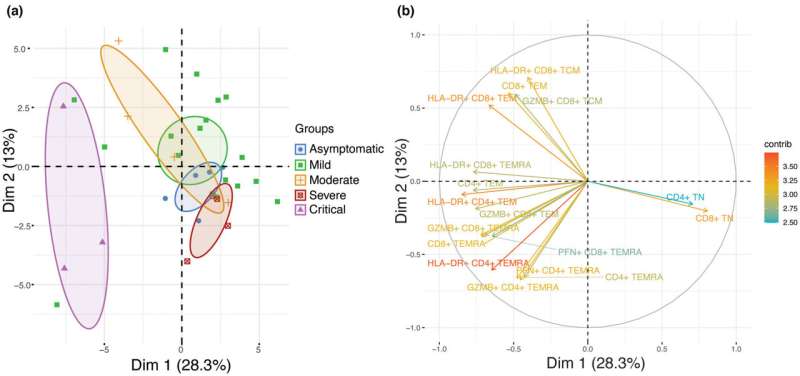August 30, 2023 report
This article has been reviewed according to Science X's editorial process and policies. Editors have highlighted the following attributes while ensuring the content's credibility:
fact-checked
trusted source
proofread
Cytotoxic CD4+ T-cells correlated to severe and fatal COVID-19 outcomes

Research led by the University of Sydney, Australia, has uncovered an important driver of critical SARS-CoV-2 infections. In their paper, "A unique cytotoxic CD4+ T cell-signature defines critical COVID-19," published in Clinical & Translational Immunology, the team finds that highly activated and cytotoxic CD4+ T-cell responses may contribute to cell-mediated host tissue damage and the progression of COVID-19.
Cytotoxic CD4+ T-cells are a subset of CD4+ T lymphocytes (commonly known as helper T-cells) that exhibit cytotoxic or cell-killing properties. These CD4+ T-cells express activation markers associated with cytotoxicity, including Granzyme B (GZMB) and Perforin (PFN), which are molecules involved in destroying infected or abnormal cells.
In the study, cytotoxic CD4+ T-cells were found to be associated with critical COVID-19 infection, possibly contributing to host tissue damage and fatal systemic inflammatory disease progression. In contrast, non-critical COVID-19 was associated with high frequencies of naïve T-cells and lack of activation marker expression.
SARS-CoV-2 infection causes a spectrum of clinical disease presentation, ranging from asymptomatic to fatal. While neutralizing antibody responses correlate with protection against symptomatic and severe illness, the contribution of the T-cell response to disease resolution or progression is still unclear.
To uncover the contribution, researchers used immunophenotyping of T-cell responses in unvaccinated individuals representing the full spectrum of COVID-19 clinical presentation from two cohorts of patients with PCR-confirmed SARS-CoV-2 infection.
The COVIMM cohort was recruited in March 2020, when the ancestral variant of SARS-CoV-2 was the dominant circulating variant in Sydney, Australia. Patients in the COVIMM cohort experienced asymptomatic and mild disease severity. The COSIN cohort was recruited in June 2021, when the delta variant of SARS-CoV-2 was dominant. Patients in the COSIN cohort experienced mild to critical disease severity.
The expansion of cytotoxic CD4+ T-cell subsets in critical COVID-19 patients suggests their potential involvement in disease progression and host tissue damage, which should be considered in future treatment strategies.
Previous studies have shown cytotoxic CD4+ T-cells operating as a second line of immunity defense, attacking cells when a virus has eluded a primary response as a sort of mitigating strategy. In the case of SARS-CoV-2, that same strategy is now associated with severe and fatal disease progression.
While the current study expertly finds a correlation between the cytotoxic CD4+ T-cells and COVID-19 disease severity, it raises a host of new research questions. Is cytotoxic CD4+ T-cells directly causal to severity and fatality? If so, why do some patients experience this and not others? Is it involved with the recruiting process and condition of specific cells targeted? Is there a way to buffer natural cytotoxic activity while other therapeutic methods are applied?
As with the result of any good study, the findings indicate that more research is needed.
More information: Sarah Baird et al, A unique cytotoxic CD4+ T cell‐signature defines critical COVID‐19, Clinical & Translational Immunology (2023). DOI: 10.1002/cti2.1463
© 2023 Science X Network



















